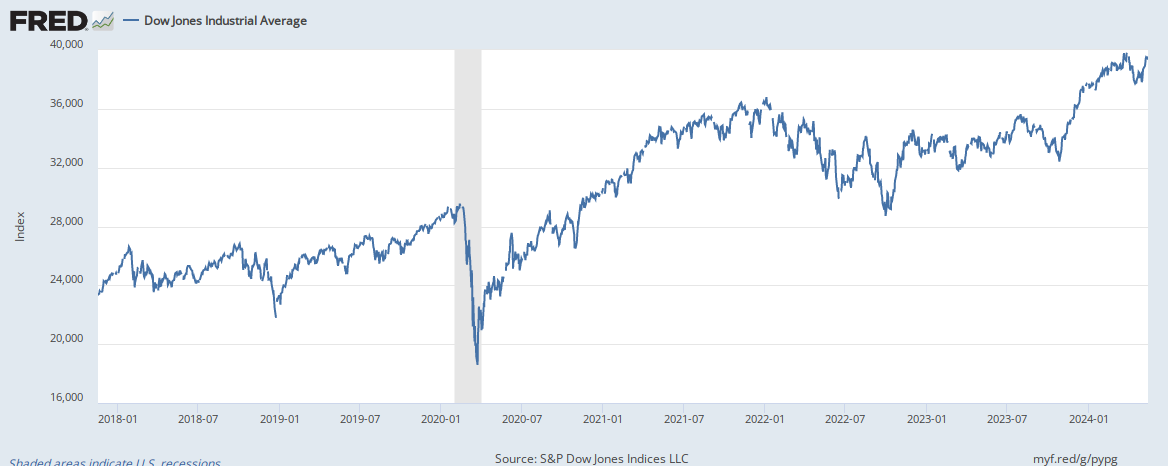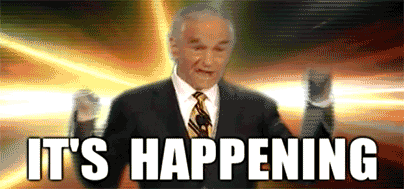Denizen
Gold Member
- Oct 23, 2018
- 4,837
- 1,062
- 190
- Thread starter
- Banned
- #121
"The debt is growing faster than the economy and that is unsustainable," Powell said.
That is evident to all rational people who are hoping the US Administration has more policies than Ivanka dreaming up 16 million jobs that will never exist.
The horse has bolted and debt is accelerating. The stable genius can't even find the stable door with both hands.
The US economy is on a path to a recession when debt is rising at around 2.5x GDP growth. Every announcement of a GDP increase will herald a 2.5x GDP growth increase in debt.
The stable genius is wallowing helplessly while his world collapses and the US economy craters.
Interest rates: Powell tells Congress federal debt is 'unsustainable'
Powell: U.S. debt is 'on unsustainable path,' crimping ability to respond to recession
Paul Davidson
USA TODAY
Powell: U.S. debt is 'on unsustainable path,' crimping ability to respond to recession
Paul Davidson
USA TODAY
Fed has cut its benchmark interest rate three times this year, leaving the central bank less room to lower rates further in case of a recession.
“The federal budget is on an unsustainable path, with high and rising debt,” Powell told the Joint Economic Committee. “Over time, this outlook could restrain fiscal policymakers’ willingness or ability to support economic activity during a downturn.”
Powell also reiterated that the Fed is likely done cutting rates unless the economy heads south.
"The outlook is still a positive one," he said. "There's no reason this expansion can't continue."
Powell gets more aggressive
The testimony marks a more aggressive tone for Powell, who generally has steered clear of lecturing lawmakers on the hazards of the federal deficit. But after raising its key rate nine times since late 2015, the Fed has lowered it three times this year to head off the risk of recession posed by President Donald Trump’s trade war with China and a sluggish global economy.
“Putting the federal budget on a sustainable path would aid in the long-term vigor of the U.S. economy and help ensure that policymakers have the space to use fiscal policy to assist in stabilizing the economy if it weakens,” Powell said.
He added, "How you do that and when you do that is up to you."
More rate cuts unlikely
Many economists are forecasting a recession next year, though the risks have eased now that the U.S. and China appear close to a partial settlement of their trade fight and the odds of a Brexit that doesn’t include a trade agreement between Britain and Europe have fallen.
Powell also said the Fed is unlikely to reduce interest rates further unless the economy weakens significantly – a message he delivered after the central bank trimmed its key rate for a third time late last month.
“We see the current stance of monetary policy as likely to remain appropriate" as long as the economy, labor market and inflation remain consistent with the Fed’s outlook, Powell said.
Since last month's Fed meeting, the government has reported that employers added 128,000 jobs in October – a surprisingly strong showing in light of a General Motors strike and the layoffs of temporary 2020 census workers.
"There's a lot to like about today's labor market," Powell said. He noted the 3.6% unemployment rate, near a 50-year low, is drawing Americans on the sidelines back into the workforce. And while average yearly wage growth has picked up to 3%, it's lower than anticipated in light of the low jobless rate. Inflation, he said, remains below the Fed's 2% target.
“Of course, if developments emerge that cause a material reassessment of our outlook, we would respond accordingly,” Powell said.
Sen. Ted Cruz, R-Texas, tried to coax the Fed chief into weighing in on the potential economic impact of "a massive tax increase," which some analysts say could be required by several Democratic presidential candidates' proposals for universal health care or free college tuition.
"I'm particularly reluctant to be pulled into the 2020 election," said Powell, a Republican and Trump appointee who has been repeatedly attacked by the president for not cutting interest rates more sharply.
warned lawmakers Wednesday that the ballooning federal debt could hamper Congress’ ability to support the economy in a downturn, urging them to put the budget “on a sustainable path.”
Powell suggested such fiscal aid could be vital after the Fed has cut its benchmark interest rate three times this year, leaving the central bank less room to lower rates further in case of a recession.
“The federal budget is on an unsustainable path, with high and rising debt,” Powell told the Joint Economic Committee. “Over time, this outlook could restrain fiscal policymakers’ willingness or ability to support economic activity during a downturn.”
Powell also reiterated that the Fed is likely done cutting rates unless the economy heads south.
"The outlook is still a positive one," he said. "There's no reason this expansion can't continue."
Don't idle:How often should I start my car in cold weather?
Death of retirement? The old work model is disappearing for boomers, Gen Xers
The auto industry is still a boys' club at the top despite GM CEO Mary Barra's success
WW, formerly Weight Watchers, unveils new plan with more choice, less hunger and, yes, pasta
Engage, ask questions and observe when investing in stock market
'Ford v Ferrari:' Cars from the upcoming movie take center stage
Medicare Part B premium 2020: Rates and deductibles rising 7% for outpatient care
Powell gets more aggressive
The testimony marks a more aggressive tone for Powell, who generally has steered clear of lecturing lawmakers on the hazards of the federal deficit. But after raising its key rate nine times since late 2015, the Fed has lowered it three times this year to head off the risk of recession posed by President Donald Trump’s trade war with China and a sluggish global economy.
Those developments have hurt manufacturing and business investment while consumer spending remains on solid footing.
The Fed’s benchmark rate is now at a range of 1.5% to 1.75%, above the near-zero level that persisted for years after the Great Recession of 2007-09 but below the 2.25% to 2.5% range early this year.
“Nonetheless, the current low-interest-rate environment may limit the ability of monetary policy to support the economy,” Powell said.
Noting the Fed has lowered its federal funds rate an average 5 percentage points in prior downturns, Powell said, "We don't have that kind of room." He added, "Fed policy will also be important, though," if the nation enters a recession. Fed officials have said they still have ammunition to fight a slump, including lowering rates and resuming bond purchases.
Deficit and debt worries
Meanwhile, the federal budget deficit hit $984 billion in fiscal 2019, the highest in seven years, and it’s expected to top $1 trillion in fiscal 2020. The federal tax cuts and spending increases spearheaded by Trump have added to the red ink and are set to add at least $2 trillion to the federal debt over a decade. The national debt recently surpassed $23 trillion.
"The debt is growing faster than the economy and that is unsustainable," Powell said.
President Donald Trump and Jerome Powell
He added that a high and rising federal debt also can “restrain private investment and, thereby, reduce productivity and overall economic growth.” That's because swollen debt can push interest rates higher.
Wealthy investors worry:More than half of high net worth investors bracing for stock drop
“Putting the federal budget on a sustainable path would aid in the long-term vigor of the U.S. economy and help ensure that policymakers have the space to use fiscal policy to assist in stabilizing the economy if it weakens,” Powell said.
He added, "How you do that and when you do that is up to you."
More rate cuts unlikely
Many economists are forecasting a recession next year, though the risks have eased now that the U.S. and China appear close to a partial settlement of their trade fight and the odds of a Brexit that doesn’t include a trade agreement between Britain and Europe have fallen.
Powell also said the Fed is unlikely to reduce interest rates further unless the economy weakens significantly – a message he delivered after the central bank trimmed its key rate for a third time late last month.
“We see the current stance of monetary policy as likely to remain appropriate" as long as the economy, labor market and inflation remain consistent with the Fed’s outlook, Powell said.
Since last month's Fed meeting, the government has reported that employers added 128,000 jobs in October – a surprisingly strong showing in light of a General Motors strike and the layoffs of temporary 2020 census workers.
"There's a lot to like about today's labor market," Powell said. He noted the 3.6% unemployment rate, near a 50-year low, is drawing Americans on the sidelines back into the workforce. And while average yearly wage growth has picked up to 3%, it's lower than anticipated in light of the low jobless rate. Inflation, he said, remains below the Fed's 2% target.
“Of course, if developments emerge that cause a material reassessment of our outlook, we would respond accordingly,” Powell said.
Sen. Ted Cruz, R-Texas, tried to coax the Fed chief into weighing in on the potential economic impact of "a massive tax increase," which some analysts say could be required by several Democratic presidential candidates' proposals for universal health care or free college tuition.
"I'm particularly reluctant to be pulled into the 2020 election," said Powell, a Republican and Trump appointee who has been repeatedly attacked by the president for not cutting interest rates more sharply.
The financial position of the United States includes assets of at least $269.6 trillion (1576% of GDP) and debts of $145.8 trillion (852% of GDP) to produce a net worth of at least $123.8 trillion (723% of GDP)[a] as of Q1 2014.
Financial position of the United States - Wikipedia
This was 2014. It is now 5 years later.
The net worth of the USA after subtracting national debt, and all other debt was in 2014... $123.8 trillion. Again subtracting National debt at that time of $17.8 trillion.
Today it is $22.6 trillion, a $4.8 trillion increase. OK... that means the net worth of all Americans & Businesses after paying off National debt is: $118 trillion. Geez.
The economy is going backward and accelerating.
Trump is a total moron and a criminal.
You wrote moments ago..The economy is going backward and accelerating.
Hmmm... Highest DJI in history... but economy going backward! Yea....
Friday provided (partial, at least) vindication. Mike Solon, a partner at US Policy Metrics, ran through the numbers in The Wall Street Journal on Monday, crediting the Trump tax cuts for what we’re now seeing.
“In the first five quarters of the Trump presidency, growth has been almost 40 percent higher than the average rate during the Obama years, and per capita growth in gross domestic product has been 63 percent faster,” Solon wrote.
Yes, Trump is Very Good for Your 401k (So Far)
Right NOW 11/15/19
View attachment 289963
You forgot to mention another major Trump achievement. 2019 is the highest year number ever to date.






